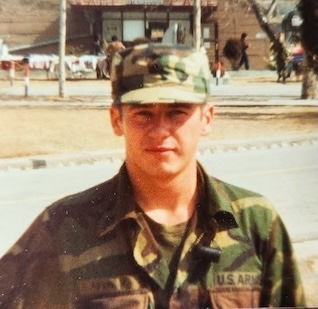“And so when you get some of the basic things that you take for granted as a civilian, you appreciate them a lot more.”
Mark Fryman enlisted in the Army in 1981, inspired by his family’s legacy of service and by his own interest in history and how the Armed Forces have shaped the past and present of the United States as a country. When he joined, he was also facing a reality familiar to many young adults – lack of available jobs and limited money for college.
But what he found was that the Army offered much more than a practical solution for a slow economy and paying for college. Military service was a formative experience that taught him perseverance, responsibility, gratitude and the value of serving others.
Fryman was assigned to the 25th Infantry Division and stationed in Hawaii. His first position was as a combat engineer, which involved supporting infantry training exercises. Platoons of combat engineers are assigned to infantry battalions and work alongside combat forces to construct minefields, bridges and roads, remove obstacles and work with demolitions.
While stationed in Hawaii, Fryman deployed briefly to South Korea, where the tensions of the Cold War were still very much a daily reality. Starting in the 1970s, the U.S. Armed Forces and the South Korean military participated in an annual joint training exercise which at the time was known as Team Spirit (now called Key Resolve). Fryman said that geopolitical climate of the early 1980s created an urgency and intensity to the training exercises.
“They practiced deploying to Korea because the North Korean threat was strong,” Fryman said. “They were still aligned with Russia and Russia was communist at the time.”
While Fryman’s deployment did not involve actual combat, the backdrop of conflict with North Korea, the proximity of hostile forces just over the border and the required training exercises, intended to model actual conflict scenarios, came with their own set of risks.
“It was intense,” Fryman said. “You’re out in the field a lot and sometimes you’d get lost from your regular units. Got dysentery from the water and everybody was sick. It has a realistic feel to it of chaos.”
While Fryman was stationed in Hawaii, a hurricane struck the islands and caused heavy damage to the military base and the surrounding community. Fryman and his fellow combat engineers were closely involved in recovery efforts and uniquely prepared to do so – after all, they had the tools, the trucks and the operational know-how at the ready. Chainsaws previously used to assist infantry units during training exercises were put to work removing fallen trees and debris from homes and other structures.
Despite the difficult nature of the circumstances, Fryman remembers the hurricane recovery effort as an important learning and service opportunity.
“That was really interesting and really rewarding to help people in such a dire situation,” Fryman said.
Fryman served three years in the Army and one year in Oregon National Guard. He decided against reenlisting and instead completed his college education using funds he earned through the Veterans Educational Assistance Program. He attended Linn-Benton Community College and then transferred to OSU to finish his accounting degree.
After graduation, Fryman worked for the Federal Deposit Insurance Corporation, better known by the acronym FDIC and earned his CPA license. He eventually found his way back to OSU, which led to his current position as director of financial accounting and reporting, a role which he has now held for 16 years.
Although there isn’t an obvious throughline between his time as an Army combat engineer and his work as a director in the DFA, Fryman believes what he learned through military service still influences him today. He said he developed discipline, learned the value of sacrifice and had the opportunity to live and work with a much more diverse community than he had growing up in West Albany, Oregon.
Along with learning to persevere through adversity and the physical challenges of military service, Fryman’s Army career also provided a window into the experiences of people living in the shadow of war, which heightened his sense of gratitude for things that most Americans may consider ordinary. He believes this gratitude is something other veterans share as well.
“It sounds weird, but you learn how to suffer a little bit,” he said. “And so when you get some of the basic things that you take for granted as a civilian, you appreciate them a lot more.”
